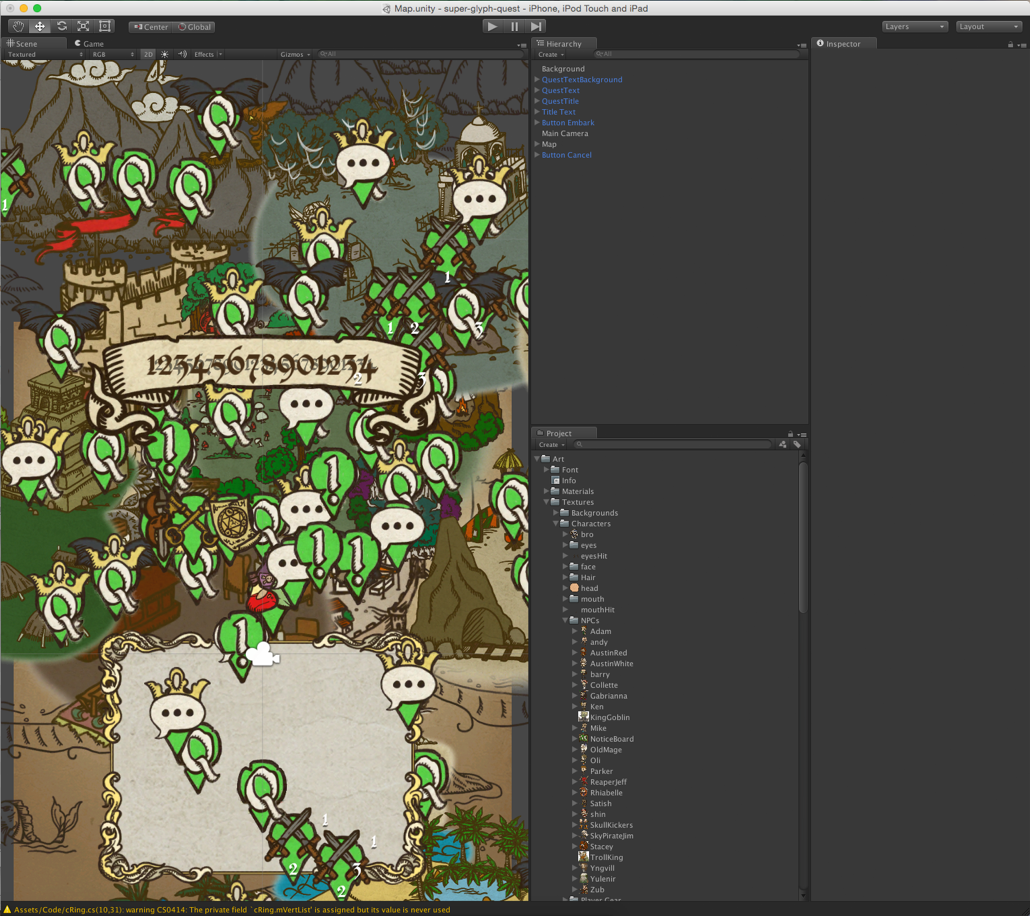Indie while Expecting: The Story of Glyph Quest
Can you charge for a game you made with the free version of Unity? Yes. YES! Making money off games is always hard, of course. But with Unity, you can get your independent project started without breaking the bank. Here’s a story of a couple who used Unity to make a mobile game to the tightest of deadlines. They’re not millionaires, but they made something of their own and earned enough to keep creating.
Both worked in the British game industry when they met. Leanne Bayley was a producer in a studio in Plymouth and Alex Trowers designed games in Brighton. In 2013, she left her job to move in with him. Soon afterwards, Leanne got pregnant and couldn’t find another job. He taught her the basics of Unity, and they started developing a game idea. Then he got fired from his job.
“Instead of doing the sensible thing and getting another job, we went indie. We believed in our game! It was really fun. Plus, there weren’t that many jobs around at that time of year. How hard can it be to finish the game before the baby arrives?” Leanne remembers.
If you’ve ever worked on a software development project, you know that the timeframe you originally estimated for delivering the complete product is often way shorter than the actual length of the project, because unforeseen issues cause delays.
But babies don’t wait. A deadline you cannot move forced the dynamic duo into making design decisions early, keeping their project concise and leaving “nice to have” features out. It didn’t hurt that Leanne has been a project manager before and Alex has been a designer since “back in the days when you had to do a little bit of everything yourself, including sound.” At one of his old jobs, he used Unity to turn himself into a one man prototyping team.
“I’m not a very good coder, it all just used to be a black box to me. But Glyph Quest is an old school sprite-based 2D game. All the fancy Unity Pro optimization features weren’t necessary. And well, I don’t know how to use them anyway,” he says.
Their advice for teams making their first project is clear: “Ambition is your enemy! You might want to make a massive multiplayer thing, but it’s better to start with something small.”
With Leanne drawing sprites and Alex working in the Unity Editor, things were progressing at a steady pace. A week before the baby was due, in January 2014, the game was ready to be submitted to the App Store. After some initial hiccups, it got approved and went out to the world.
Glyph Quest got featured in the British App Store and named Game of the Week by Touch Arcade. About 200,000 people have downloaded it so far. “We’re really proud of our community. It’s not really big, but very loud and positive. After the initial push, it got a bit harder to discover the game, but those who do, love it!”
The game monetizes like good old shareware: you get some levels for free and then you can buy the rest of the game. A full 10% of users did so, which is amazingly high for a mobile game nowadays. This was definitely a good start for the team and allowed them the financial independence to continue their work. But it was still a rather limited budget for producing the sequel they had planned.
Working on the game while having the newest family member around is tough. “Sometimes, you just look at how cute she is and then you wonder where the whole day went,” says Alex. Working on Super Glyph Quest meant crunching hard on the little amount of sleep that new parents can get. “She’s our biggest distraction and biggest motivation at the same time. We have to aim to be financially sustainable.”
The game ended up releasing at the end of October, when many publishers plan big updates and new releases before Halloween. It’s also straight up premium and unfortunately hasn’t done so well as the original. It has way more content, building on the original’s match three to cast spells gameplay with a great story and some pretty interesting strategic elements. But that hasn’t been enough to attract players willing to pay up front.
“In the Unity Brighton community, nobody’s really complaining about how hard it is to make games. We just always talk about issues with publishers and how hard it is to monetize games,” says Alex.
We hope that Unity’s new focus on services will help teams like this one with the business part of game development. In the meantime, they’re working on updates, new projects, localization and other adventures. And they don’t plan on buying Unity licenses any time soon.
“We’re big fans of Unity, this whole endeavour wouldn’t be possible without it. It’s awesome that it’s free, since we don’t have any spare money in our monthly budget. Nappies are really expensive! Plus, we just never needed Unity Pro features.”
Anyone can publish a game with the free version of Unity, our only restriction is that you need to buy Unity Pro after you've reached $100,000 in revenue.
Super Glyph Quest is out on the App Store. It’s seriously a good game, ideal for killing time during the holidays. So go buy it.
Is this article helpful for you?
Thank you for your feedback!
- Unity Labs
- Copyright © 2024 Unity Technologies
